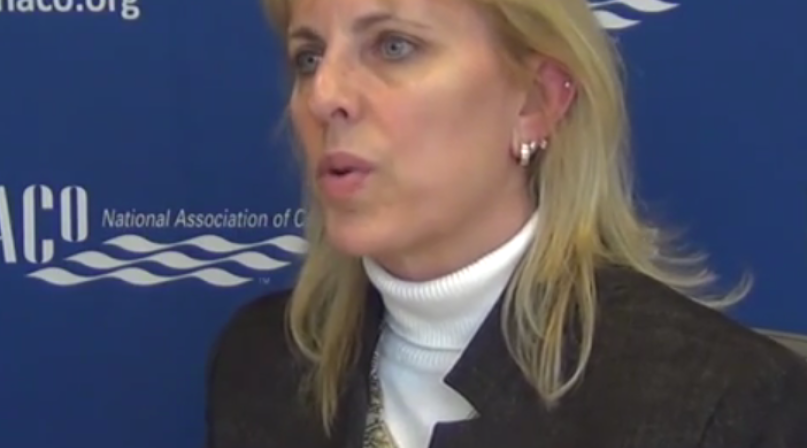NACo joins ‘Campaign to Change Direction’

Commissioner Mary Ann Borgeson, Douglas County, Neb., chair of NACo’s Health Steering Committee, joined leaders from government, nonprofit and the business community to announce The Campaign to Change Direction, a national initiative to create a new story in America about mental health, mental illness and wellness.
The campaign, launched March 4 at a mental health summit in Washington, D.C., included a keynote address from First Lady Michelle Obama, an appearance by the Academy Award-winning producer of Silver Linings Playbook, Bruce Cohen, and a performance by G.R.L., a musical group that was personally touched by the issue when their lead singer, Simone Battle, committed suicide in September 2014.
Inspired by discussions at the White House National Conference on Mental Health in 2013 and led by the nonprofit organization Give an Hour, “Change Direction” is a response to the way society addresses mental health. One-in-five Americans lives with a diagnosable mental health condition, and counties are a major cornerstone for behavioral health services.
Through more than 750 behavioral health authorities and community providers, counties plan, operate and finance communitybased services for persons with mental illnesses, substance use conditions and intellectual and developmental disabilities.
Borgeson, who spoke at the launch event, said, “As county leaders, we are committed to improving the responsiveness, coordination, accountability and integration of person-centered behavioral health services in appropriate settings.
“And this extends to our nation’s heroes who reside in our communities…our veterans and their families, who face unique barriers to accessing services. We are in your communities and we care — and we will continue to give a voice to those who feel like they have none.”
Attachments
Related News

USDA and HHS release new dietary guidelines
On January 7, U.S. Department of Agriculture Secretary Brooke Rollins and U.S. Department of Health and Human Services Secretary Robert F. Kennedy, Jr. unveiled the new Dietary Guidelines for Americans, 2025–2030.

SAMHSA cancels, reinstates thousands of behavioral health grants
Late on Wednesday, January 14, the Administration announced that thousands of Substance Abuse and Mental Health Services Administration (SAMHSA) grants that had been terminated just one day earlier would be reinstated.

House passes three-year extension of ACA Enhanced Premium Tax Credits
On January 8, the U.S. House of Representatives passed legislation to extend enhanced Affordable Care Act (ACA) premium tax credits (EPTCs) for three years, sending the measure to the Senate as lawmakers work to negotiate a bipartisan compromise.
